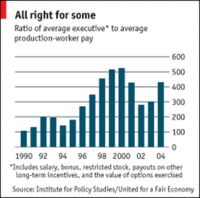Posts selected fromManagement Blog - Engineering Blog - Investing Blog and other blogs - Managing Innovation
You manage processes such as thinking up a new way to use computer technology differently than you manage a process to manufacture tires. But the idea that you don't manage and improve the process just because the process seems discontinuous is a mistake. continue reading: Managing Innovation - The Failure to Improving Using the Ideas of Peter Drucker and Others
Many of their ideas are ignored. However, even so, his influence on management in America, and worldwide, has been significant and positive. The way I see it even though managers are only benefiting from say 20% of the wisdom of Deming or Drucker that could very well still make Deming or Drucker the most influential management expert.
Related: Why Use Lean if So Many Fail To Do So Effectively continue reading: The Failure to Improving Using the Ideas of Peter Drucker and Others - The Economist on Drucker
In the late 1990s he turned into one of America’s leading critics of soaring executive pay, warning that “in the next economic downturn, there will be an outbreak of bitterness and contempt for the super-corporate chieftains who pay themselves millions.”
continue reading: The Economist on Drucker - Innovation and Research and Development
Innovation can be related to productivity improvement or it can be completely unrelated. A company could innovate with an ideas like the remote control for televisions (or microlending or air bags). That innovation may not contribute in any way to manufacturing televisions more productively.
Other innovation may be related to improving the productivity alone and add no additional functionality to the customer. Many innovations will provide a combination of both benefits. Both innovation and productivity improvement are important. continue reading: Innovation and Research and Development - Superior Customer Experiences Start with Respect for Employees
Oakley found that there is a direct link between employee satisfaction and customer satisfaction, and between customer satisfaction and improved financial performance. Employee satisfaction is a key antecedent to employee engagement. He also found that organizations with engaged employees have customers who use their products more, and increased customer usage leads to higher levels of customer satisfaction.
This is not a zero-sum game. Good managers grow the pie so all the stakeholders can get more benefit (customers, investors, employees…). continue reading: Superior Customer Experiences Start with Respect for Employees - Eliminating Complexity from Work
as much as half of the activities of about sixty people had been to set up and take down jobs, expedite, move material, count material, and do other tasks that were unnecessary in the new process.
Tim Fuller's article discusses how much inneficiency was removed from the process by adopting single piece flow in 1985. How long did it take for management practice to understand this? Certainly this understanding wasn't widespred in 2005. I am not even sure it if it is widely understood and systems have been designed or redesigned with this knowledge in 2017. continue reading: Eliminating Complexity from Work - Management Improvement Flavors
Some tools are much more common in one program, even if they are not limited to one program (such as Design of Experiments used heavily in six sigma). But design of experiments existed long before six sigma and was used by sensible people to improve for decades before six sigma.
The biggest difference I see in the programs is the overall aim. And that overall aim affects everything else. I happen to be a fan of Deming’s ideas. Most of these programs take a great deal from Deming’s ideas. I believe Lean is closest to Deming’s ideas (which makes sense as Lean is essentially the Toyota Production System TPS). continue reading: Management Improvement Flavors - Toyota Manufacturing Powerhouse
Unusual among automakers, “they don’t hide a lot,” Coventry said. “It’s like going to the Super Bowl and having the opposite side throw their playbook on the table. It’s as if they feel they can still beat you on the field.”
Toyota has greatly advanced management practice worldwide through their actions.
In a reflection of Toyota’s team-oriented approach, its executive pay is paltry by U.S. standards. Analyst Ron Tadross at Banc of America Securities estimates the total annual compensation of Toyota’s CEO at under $1 million – about as much as a vice president at GM or Ford Motor Co. makes in a good year.
The executive pay crisis in America is a symptom of the failure of American management to understand their role. Executives are part of the system and have acted shamefully in allowing obscene pay for a few while claiming they must force others to suffer (due to “the market”). continue reading: Toyota Manufacturing Powerhouse - Landscaping Firm Applying Deming's Management Ideas
Each Brickman branch operates with a standard production model that the company developed in the late 1970s with consultant and renowned statistician W. Edwards Deming... Scott Brickman said the model emphasizes continuous improvements in communication with its nearly 10,000 commercial customers and education and cultivation of its employees to learn and advance within the company.
continue reading: Landscaping Firm Applying Deming's Management Ideas - Excessive Executive Pay
 The excesses are so great now they will either force companies to:
- take huge risks to justify such pay and then go bankrupt when such risks fail (and some will succeed making it appear, to some, that the pay was deserved rather than just the random chance of taking a large risk and getting lucky).
- make it impossible to compete with companies that don’t allow such excesses and slowly go out of business to those companies that don’t act so irresponsibly
- hope that competitors adopt your bad practice of excessive pay (this does have potential as most people are corrupted by power, even across cultural boundaries). However, my expectation is the competitive forces of capitalism going forward are going to make such a hope unrealistic. People will see the opportunity provided by such poor management and compete with them.
As long as the pay packages were merely large, and didn’t effect the ability of a company to prosper that could continue (slicing up the benefits between the stakeholders is not an exact science). The excesses recently have become so obscene as to become unsustainable. continue reading: Excessive Executive Pay - Steve Jobs on Quality, Business and Joseph Juran
 - Fear Remains a Toyota Motivator
First, don’t let the title fool you, this is not an indication Toyota is going against Deming’s obligation of management to “Drive out fear and build trust so that everyone can work effectively”.
...
Rather than being drawn to improve it is most often stated as being scared that if we don’t we will have to pay for failing to improve. Thus the reference to fear. continue reading: Fear Remains a Toyota Motivator - Google: Ten Golden Rules (2005)
The suits inside Google don’t fare much better than the outside pros. Several current and former insiders say there’s a caste system, in which business types are second-class citizens to Google’s valued code jockeys. They argue that it could prove to be a big challenge in the future as Google seeks to maintain its growth.
Google really is doing things differently. One way you see it is that some of those used to being the most powerful players complain that they don’t get respect at Google, at Google the engineers rule. Um, maybe they shouldn’t complain too loud, maybe the reason Google is doing better is they focus on the Gemba (where value is added to the customer). continue reading: Google: Ten Golden Rules (2005) - Performance of People: Does Performance Appraisal Help?
Why can’t performance be numerically rated and ranked? It can’t be defined operationally, it can’t be measured with any degree of precision, it can’t be separated from other effects, and it is destined to vary over time in any case. Any one of these factors present significant (if not insurmountable) problems itself. Combined the problems create an impossible barrier.
continue reading: Performance of People: Does Performance Appraisal Help? - Data Based Decision Making at Google and Elsewhere (2005)
Google has done a fantastic job of using data to make decisions. In fact so much so, that some think they may go overboard trying to find an algorithm for everything.
I believe you can’t measure everything that is important. I also believe in most organizations the amount of stuff you can’t measure usefully and realistically is quite a bit higher than it is for Google. Having highly intelligent, skilled and experienced people who can derive complex formulas effectively does greatly expand the effective use of measurements.
Still there are limits, and those limits are much lower for most organizations that have neither, thousands of phd level mathematicians, rocket scientists, software engineers etc. nor a anything approaching Google’s percentage of such people.
Still I think we will benefit from the innovation that will continue to take place at Google. The are making great strides in using data to inform their decision making process. continue reading: Data Based Decision Making at Google and Elsewhere (2005)
|